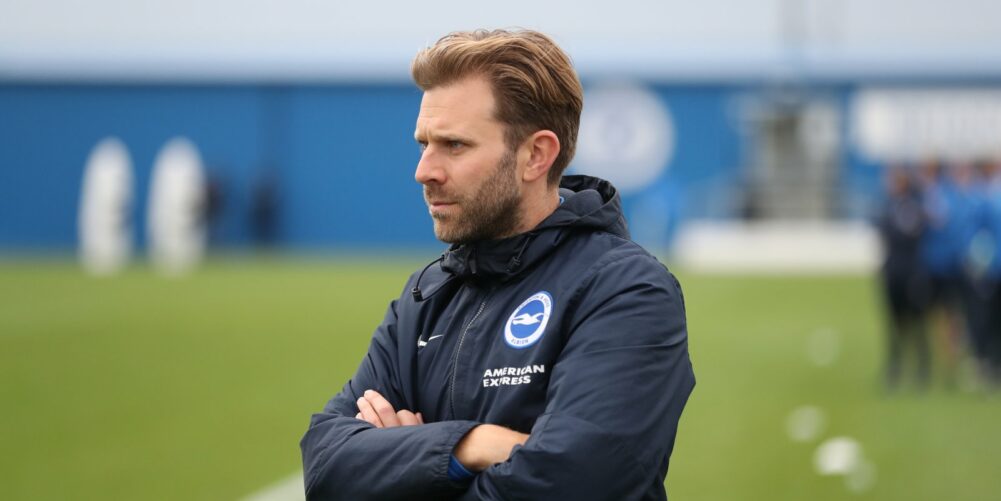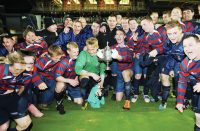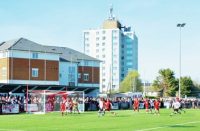(Picture credit: Paul Hazlewood)
By Matt Badcock
As places go, to find out the club you manage have been booted out of its competition, Italy’s Amalfi Coast is on the more scenic side.
Fair to say, a phone call to the Football Conference’s HQ wasn’t exactly on Mikey Harris’ sightseeing list.
“Because I was on my honeymoon, I turned my phone off the majority of the time,” the then Salisbury City manager says.
“But I went onto BBC News because someone sent me a message suggesting I should and it said, ‘Salisbury demoted for financial irregularities’.
“I spoke to Dennis Strudwick from my honeymoon to say: Please can you give us a week to sort this mess out because I know there’s people who can step in and save the club!”
The plea was always a long-shot. Harris had just married Sarah Gomme – the pair met when Gomme, an ITV journalist, interviewed Harris as part of Salisbury’s FA Cup run to the third round – and gone away feeling good about the new season.
His first campaign in sole charge following boss Darrell Clarke’s switch to Bristol Rovers had been a resounding success. A 12th-place finish in 2013-14 came at the end of a year where they’d flirted with the play-off positions.
But the club was first demoted for failing to pay debts before being expelled altogether following a bizarre takeover that saw a fan team-up with a supposed Middle East businessman Otail Touzar.
Scepticism wasn’t exactly in short supply with Touzar, who claimed to be friends with Jose Mourinho, eventually banned by his own club.
A phoenix side starting again at Step 5 was the only clear outcome and for Harris it meant all plans had gone up in smoke.
“I pretty much had all the boys I wanted teed up – players that have gone on to play in League One and the Championship,” Harris says. “Angus MacDonald, Stuart Sinclair, James Clarke, Will Puddy, Elliott Frear has gone on to play in the SPL, Rob Sinclair did well in the Conference with Forest Green.
“So we had a nucleus of a really, really competitive squad, along with some others I’d lined up to bring in. We felt we were in a good position to challenge.
“Personally it was absolutely gutting to see the club I’d been part of for a decade as a player, coach, assistant and then manager… to see how it had grown and been built over the years to a position where we felt the next season we could actually challenge for a place in the Football League – to have that taken away was tough to take.”
Sleep diaries
Harris had hit the headlines when he took the Whites job 12 months earlier. At 28 years of age, he was the youngest manager in professional football. Whether people were writing him off or not, Harris always paid little heed to the outside noise and wasn’t fazed.
Instead, being the positive and determined character he is, he focused on his undoubted talent as a coach that had been honed at Salisbury since he was 23 when Tommy Widdrington appointed him assistant-manager before taking on the same role with player-boss Clarke. Harris’ forward-thinking approach to the game – Salisbury players had to keep sleep diaries as one example of the level of detail he took – translated into results. So when City went to the wall, opportunity quickly knocked elsewhere.
He took a job at Portsmouth’s Academy where he had great success with the U18s while also taking a newly-created U23 side to the semi-finals of the Premier League Cup, also learning from first team bosses at his boyhood club like Andy Awford, Paul Cook and Kenny Jackett.
Last November he moved on to Brighton & Hove Albion’s Academy where he is in joint charge of the U18s with former Loxwood and Tooting manager Mark Beard.
“The staff from top to bottom are fantastic and I’m loving every minute of it,” he says. “Mark and I take the U18s together, he’s brilliant to work with and we bring a lot to the table with our experiences in Non-League.
“We played Chelsea last week, we play Tottenham, Arsenal, West Ham – big clubs with incredible academies – and preparing games against teams like that can only improve you as a coach.”
Learning curve
Part of that learning curve has been adjusting to preparing a team with a bigger end goal than one who needs to pinch a point in the league away on a Tuesday night.
And he loves playing a part in the development of young footballers and, ultimately, people.
“If there’s one big thing I can say about Brighton and our academy it’s that the holistic approach is second to none,” Harris says. “The support the players get off the pitch with their education, mental health strategy, nutrition advice – everything is geared to them being the best version of themselves on and off the pitch.
“It’s not just about what happens on the pitch; it’s about producing well-rounded young men and women, because we have a girl’s academy and women’s team too.
“I know all that can sound a bit corny, can’t it? But you’ve got a massive responsibility to give the boys and girls the best chance.”





















